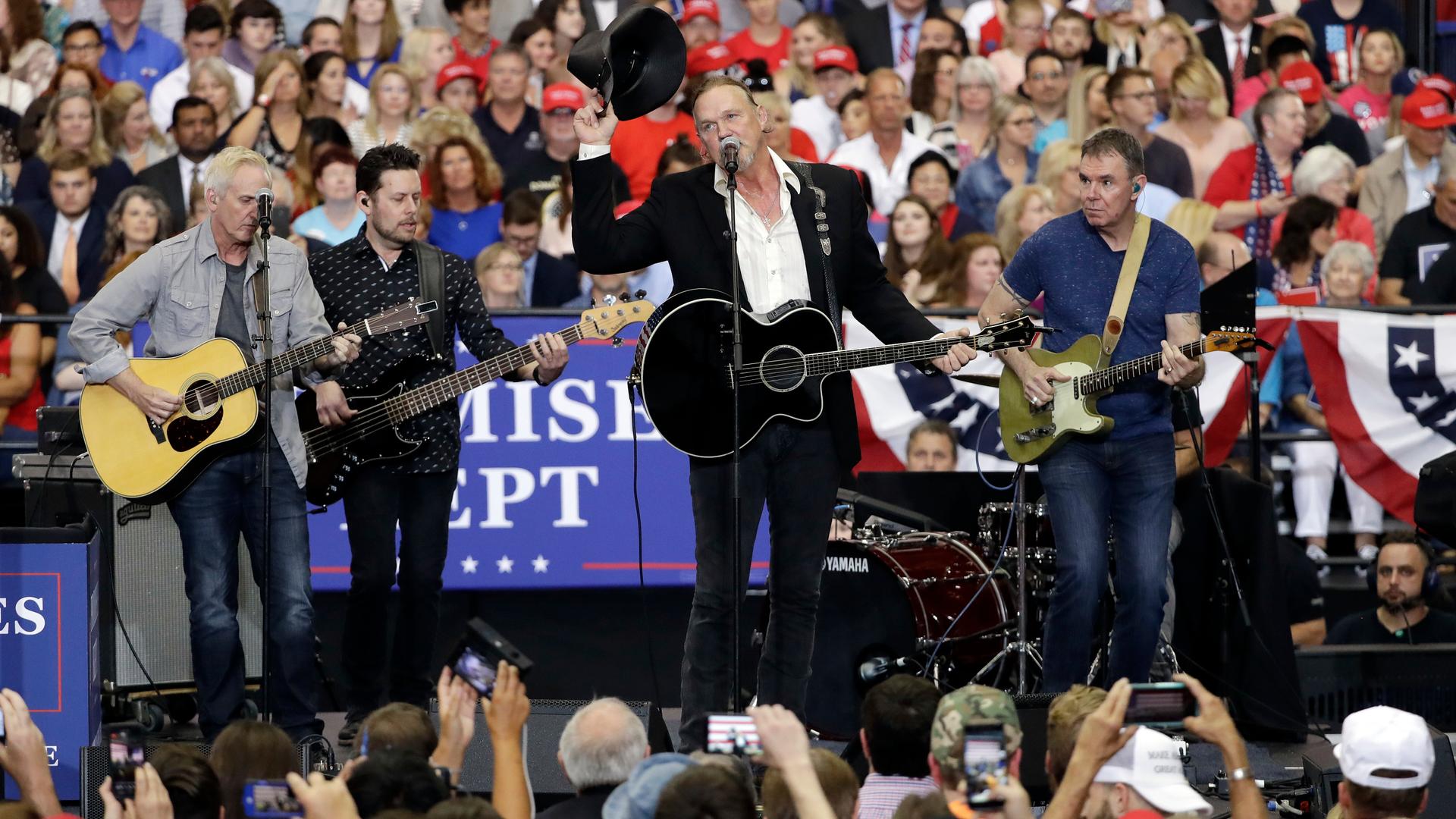Among the enduring aspects of what can only be described as the surreal popular cultural context of the 2020 US election has been the music selection that President Donald Trump has employed throughout his campaign.
If you’re somehow unfamiliar with the oeuvre of the Make America Great Again rallies, fear not: The Trump campaign has uploaded the full playlist onto Spotify, so you can feel like you’re surrounded by a sea of unmasked people in red hats from the comfort of your own home.
Scrolling through the playlist yields a heady mix of nostalgic classic rock and infectious feel-good energy. And to the campaign’s credit, it gets the crowd going. What the actual lyrics and themes that the songs are crafted around, don’t really matter – it’s the vibe they inspire.
Greetings from cold and rainy Lansing, Michigan where Trump supporters are keeping warm dancing to Laura Branigan hit Gloria while waiting for start of 2pm @POTUS @realDonaldTrump rally. pic.twitter.com/508i6YR1Dv
— Kristinn Taylor (@KristinnFR) October 27, 2020
The Rolling Stones’ “You Can’t Always Get What You Want” has been a mainstay on the campaign trail for Trump’s political career, often played as a closer after he’s done speaking. Others include “Free Fallin” by Tom Petty’; “Paradise City” by Guns N’ Roses; Frank Sinatra’s “My Way”; and the delightfully homoerotic energy of Village People’s “YMCA” and “Macho Man”.
Other sonically strange choices are Linkin Park’s “In the End”, which is near the top of the playlist, and Creedence Clearwater Revival’s classic track “Fortunate Son,” which truly epitomises how little the campaign cares about the message a song conveys and has become a favourite over the past few months.
The song, which rails against the privileged children of elites who got everything handed to them from their parents and managed to dodge the Vietnam draft, seems like the kind of track you’d want to reconsider if you thought your audience would care about the glaring connection.
Songwriter John Fogerty went in on Trump’s use of “Fortunate Son” in a statement that he tweeted out on October 16.
— John Fogerty (@John_Fogerty) October 16, 2020
Cease-and-desist orders
Before and after assuming the presidency in November 2016, Trump’s relationship with popular musicians hasn’t been the best – to put it lightly.
Barely anyone wanted to perform at his inauguration in January 2017, and now most of the headlines recently have been about artists spurning Trump for using their songs at political gatherings.
Various levels of denunciation and threats of legal action have come from the Rolling Stones, Phil Collins, Queen, and the Village People, among others.
Trump’s fascination with Elton John and Neil Young, and their disapprovals of his use of their music, must have had to sting in particular.
Ire and lawsuits aren’t just reserved for jukebox classic-rock standards either: Adele, Pharrell and Rihanna are among the current crop of disgruntled victims.
The estates of deceased artists Prince, George Harrison, Tom Petty, Leonard Cohen and Luciano Pavarotti have all issued scathing cease-and-desist letters to Trump’s campaign as well.
While there’s a long history of artists objecting to their music being used by politicians, it has turned into a ruckus around Trump.
Dozens have signed a letter, demanding that politicians obtain “consent” for using songs on the campaign trail to avoid “legal risk and unnecessary public controversy.”
Despite the flurry of statements and lawsuit threats, Trump has continued to use many of the songs at his rallies.
In June, representatives for the Rolling Stones released a statement saying that if Trump continued to use the band’s music in his campaigning efforts he may be sued.
There’s a strong connection between pop culture and electioneering in the US, and the use of songs at rallies is generally covered by the licenses for performing rights collection societies ASCAP and BMI, with packages of songs available for use that number into the millions.
Normally cease-and-desist letter suffices – and plenty have been sent – but the president and his campaign team seem unconcerned.
Joe Biden meanwhile has enjoyed a rather more cooperative relationship with the music world, and the Biden-Harris campaign appears to have taken a more strategic approach to its use of music.
The New York Times carried out an analysis during the primaries which showed that there was almost an even split between black and white artists in Biden’s playlists. The greater presence of pop in comparison to Trump’s rock classics might be an attempt to reach younger voters.










Discussion about this post